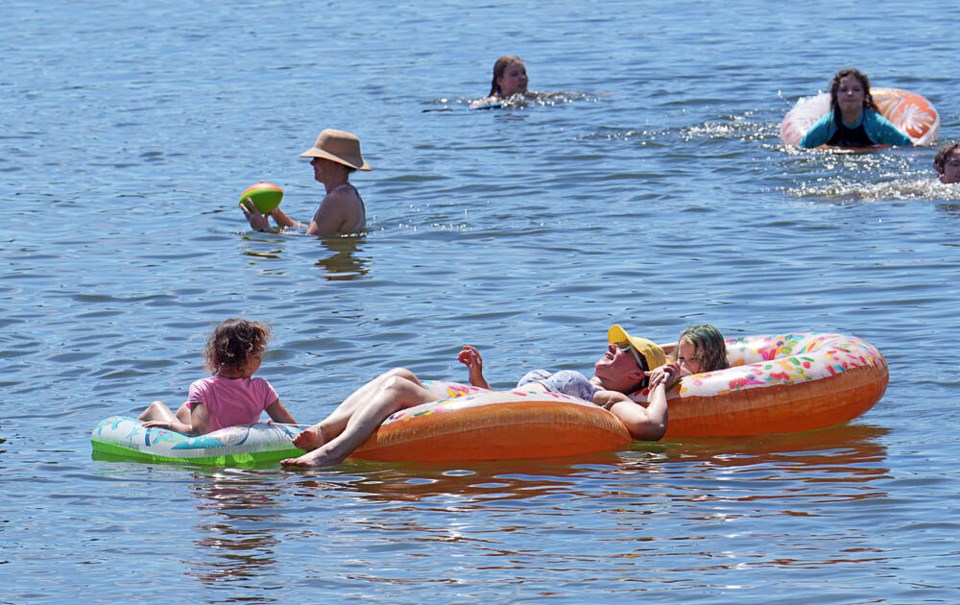Amid another sizzling summer for much of North America, tens of millions of people must cope with extreme temperatures, deadly wildfires and sweaty underpants, like, all the time.
Naturally, the unbearable heat and safety concerns raise some serious questions, such as: WHAT COULD WE POSSIBLY HAVE DONE TO AVOID THIS SITUATION? I mean, not the objectively obvious, rational and scientifically proven things we have been encouraged to do for decades, but more, you know, easy things like eat more ice cream.
Another question I’ve been meaning to ask: Is it hot enough for you? Hahahaha no, but seriously, how hot is too hot before we die?
Don’t worry, medical science has answers to all our questions! Except, obviously, questions about knee replacement surgery wait times in British Columbia.
Heat, as defined by medical science, is a condition where a mammal is aroused sexually, i.e. in estrus and eager to mate with… hang on, sorry. I should have checked that sentence ahead of time and warned you to clear any children out of the room, especially American children who might be begging for room and board, now that the U.S. Supreme Court has criminalized homelessness.
Let’s try this definition: Heat is a form of energy that is transferred between objects due to a temperature differential, for example between the sun (extremely hot at 5,600 C) and the surface of Earth (global average: 15 C) and/or your underpants (personal best = 250 C). Heat always moves from a more-hot thing to a less-hot thing, which is why your wife puts her feet on you during the night.
The issue is that our planet and our underwear can only take so much heat from the sun because the human body only functions within a pretty narrow temperature range, above or below which — there’s no way to sugarcoat this — you die.
The lower end of the range for a healthy adult is about 28 C. Anything below that and your body involuntarily does something drastic — like uncontrollable shivering, or moving to a trailer park in Arizona while you are sleeping. The upper body temperature range starts around 32 C, above which your body involuntarily responds with sweating (see underwear, above) and vasodilation, when your face goes all red with embarrassment and/or angry, alt-right conservativism.
All of this involuntary action is because you and I and all the other humans are what biologists call homeothermic. Before you reach for the Project 2025 battle plan to see where this term lands in the culture war, let me say that it is just a science-y word for what certain animals do for temperature control.
If an animal maintains its body temperature at a constant level, say by shivering when it’s cold outside, or sweating when it’s hot outside, it is called “homeothermic.”
On the other hand, if an animal cannot physiologically regulate its body temperature and has to burrow in the ground or bask in the sun, it is called “poikilothermic.” Hahaha, what a dumb name, go ahead and laugh at them, the cold-blooded losers! (Note: Only do this on a cold day when they cannot move. On a warm day, poikilotherms — examples include saltwater crocodiles, Burmese pythons, sharks, piranhas and tarantula spiders — move very well indeed.)
To augment the automatic homeothermic systems in our bodies, there are a few easy things we can do to help stay cool in the crazy heat:
• Drink cool liquids. Yes, of course I mean beer, which is not true but doesn’t make this medical advice any less gooder. Excuse me, my shoes are too tight. The point is, any cool liquid aside from alcohol and gasoline helps reduce body temperature from the inside out. Cheers!
• Eat spicy foods. Spicy-hot-hot foods with cayenne, jalapeño and habanero peppers are full of a particularly irritating chemical called capsaicin, which causes human bodies to sweat more, cooling us down. Before you reach for the Louisiana XXX Hot Sauce, I should probably mention capsaicin also causes vasodilation (see Donald Trump’s face) and diarrhea (see JD Vance’s face).
• Annex cooler air. My new favourite place to relax is the frozen foods section of the grocery store near my house. It is so clean and cool. Also, I feel like I already paid for this. The average Canadian family is expected to spend $16,297.20 on food in 2024, an increase of $701.79 from last year, compared to an increase of $1,065 in 2023. Yes, I paid for this.
• Go jump in a lake. Obviously not Beaver Lake in Saanich, currently chockablock with deadly blue-green algae which – according to the posted signs — produce cyanotoxins. That sounds bad. I would look up exactly how bad, but I have already seen and smelled Beaver Lake. No thank you.
However, Vancouver Island is completely surrounded by water! Whether you jump, wade or get pushed in, cold water reduces body temperature through the process of conduction. Try not to think about all those poikilotherms you insulted in the paragraphs above, now swimming around, preparing to eat you.
• Slow down. The more you move, the more heat your body generates and then has to deal with. During our ever-more-intense heat waves, it’s best to take it easy, lemon squeezy.
I mean it: Slow down and cool it. That includes losing our peace over the culture war raging in the hinterlands, which ignores science and facts in favour of how the notion of climate change makes people feel about themselves. Look, we all feel terrible.
Sweaty underpants all the time feels terrible. Climate-related disaster feels terrible. Being confronted with the inadequacies of your climate change denial feels terrible. But regardless of all the bad feels, we have to do something.
Who wants ice cream?



